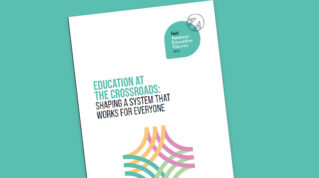The Eden Academy Trust is a family of six schools that educate children and young people with complex needs. Our core purpose is to create centres of educational excellence where young people achieve exceptional outcomes and, as a MAT which focuses on educating a hugely diverse pupil population, inclusion in relation to our students is fundamental to that core purpose and something we believe we do well.
Reflections on inclusion
However, the events of June 2020 forced us to reflect on our practices and question how inclusive we truly were, not just for our pupils, but for all those who are part of our community – particularly our staff. Two years on, NFER research into racial equality in the teacher workforce has shown our instincts right. System-wide, teachers from Black and ethnic-minority backgrounds face challenges from initial application and all the way through their careers. The work of bringing down these barriers is each leader’s responsibility.
This sentiment is certainly not unique to our MAT. Recent reports suggest that four in five teachers believe that more can be done to celebrate diverse cultures, people and experiences in our schools. Our work to create an actively anti-racist organisation began almost immediately after the horrific murder of George Floyd, which had a profound impact on a number of our staff. Our CEO and chair of trustees wrote an open letter to all staff members setting out this ambition, and quickly established a working group to support the organisation to achieve it.
With the implementation of an anti-racist framework and forced to dig deep in considering which of our practices and policies disadvantaged individuals, it quickly became apparent that race was not the only characteristic we needed to be mindful of. We questioned how we were valuing all the unique qualities our colleagues possess and knew we needed to make it clear to them that those differences informed important contributions to the organisation.
Power in difference
In committing to ensure that all staff feel valued and have a sense of belonging, we knew the benefits for the trust would be numerous too. Recent large-scale international research concludes that companies who foster a more inclusive working environment enjoy increased employee engagement, innovation and levels of creativity. Everyone wins.
Our special school trust grew out of a belief that by working together and sharing effective practice, our pupils were more likely to achieve exceptional outcomes. The same applies to our staff. The NFER’s research finds that many schools employ all-white workforces. And if we are all the same (or treated as such), then ‘togetherness’ feels like less of a leadership and cultural challenge. It is also far less powerful and valuable. Even among these teams, however, there are differences to celebrate. And that’s a good place to start to create an environment where individuals feel safe to be their authentic selves and maximise their potential.
From intention to action
Importantly, in doing this we are going back to our original core values. But these are surely universal to education: inclusion, giving everyone a voice and making sure people feel represented and validated. The key is that they can’t stop at our work with pupils.
We recently held a conference for staff in the south of the trust, with opportunities for them to explore what makes them unique, share the challenges they face and listen to other people’s difficulties and challenges in achieving equality. The day was an important stepping stone towards our goal of greater inclusivity – inclusivity that can only be measured by how our staff feel.
We recognise that there is still much more work for us to do on this journey to become fully inclusive. Our current priorities are diversifying our board of trustees and overhauling of recruitment processes, which we know is one of the biggest issues driving lack of diversity in MATs.
And we know developing a culture of inclusion and diversity that benefits all our communities is ‘a movement, not a moment’. So we’re in it for the long haul.
Are you?















Your thoughts